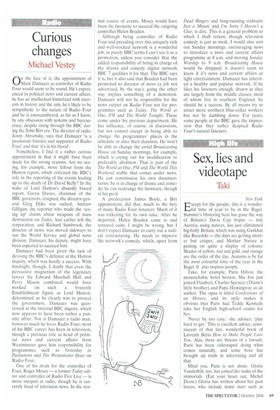Curious changes
Michael Vestey
r‘n the face of it, the appointment of L./Mark Damazer as controller of Radio Four would seem to be sound. He's experienced in political news and current affairs, he has an intellectual hinterland with interests in history and the arts, he's likely to be sympathetic to the nature of Radio Four and he is unencumbered, as far as I know, by any obsession with systems and bureaucracy, despite rising through the BBC during the John Birt era. The director of radio. Jenny Ahramsky, says that Damazer 'is a passionate listener and supporter of Radio Four' and that 'it's in his blood'.
Nonetheless. I find it a rather curious appointment in that it might have been made for the wrong reasons. Are we seeing, for example, more fallout from the Hutton report, which criticised the BBC's role in the reporting of the events leading up to the death of Dr David Kelly? In the wake of Lord Hutton's absurdly biased report, Gmyn Davies, chairman of the BBC governors, resigned, the director-general Greg Dyke was sacked, Andrew Gilligan, the reporter who made the 'sexing up' claims about weapons of mass destruction on Today, had earlier left the corporation, and Richard Sambrook, the director of news, was moved sideways to run the World Service and global news division. Damazer, his deputy, might have been expected to succeed him.
Damazer had been given the task of devising the BBC's defence at the Hutton inquiry, which was hardly a success. With hindsight, though, I doubt that even the persuasive magnetism of the legendary lawyer Sir Edward Marshall Hall and Perry Mason combined would have worked on such a brazenly Establishment figure as Lord Hutton, determined as he clearly was to protect the government. Damazer was questioned at the internal BBC inquiry, which now appears to have been rather a panicky affair. Nor is Damazer a radio man, however much he loves Radio Four; most of his BBC career has been in television, though a previous role as head of political news and current affairs from Westminster gave him responsibility for programmes such as Yesterday in Parliament and The Westminster Hour on Radio Four.
One of his rivals for the controller of Four, Roger Mosey — a former Today editor and controller of Radio Five Live — is more steeped in radio, though he is currently head of television news. In the nor
mal course of events, Mosey would have been the favourite to succeed the outgoing controller Helen Boaden.
Although being controller of Radio Four and presiding over this uniquely rich and well-stocked network is a wonderful job, in purely BBC terms I can't see it as a promotion, unless you consider that the added responsibility of being in charge of the drama and comedy digital network BBC 7 qualifies it for that. The BBC says it is, but it also said that Boaden had been promoted to director of news (a job not advertised, by the way); going the other way implies something of a demotion. Damazer will not be responsible for the news output on Radio Four nor for programmes such as Today, The World at One, PM and The World Tonight. These come under his previous department. He has influence, of course, in discussions, but not control except in being able to change the programmes' places in the schedule or alter their duration. He won't be able to change the awful Broadcasting House on Sunday mornings, for example, which is crying out for modification or preferably abolition. That is part of the The World at One, PM and The World This Weekend stable that comes under news. He can commission his own documentaries: he is in charge of drama and comedy; he can rearrange the furniture, though at his peril.
A predecessor James Boyle, a Birt appointment, did that, much to the fury of many Radio Four listeners. Much of it was tinkering for its own sake. After he departed, Helen Boaden came in and restored calm. I might be wrong, but I don't expect Damazer to carry out a radical restructuring. He needs to improve the neRvork's comedy, which, apart from
Dead Ringers and long-running stalwarts Just a Minute and I'm Sorry I Haven't a Clue, is dire. This is a general problem to which I shall return, though television comedy is just as weak. I would also sort out Sunday mornings, encouraging news to introduce a news and current affairs programme at 8 a.m. and moving Sunday Worship to 9 a.m. Broadcasting House would be dropped; it doesn't seem to know if it's news and current affairs or light entertainment. Damazer has inherited a healthy and popular network. If he likes his listeners enough, drawn as they are largely from the middle classes, most of whom live in southern England, he should be a success. By all means try to attact more northern blue-collar workers but not by dumbing down. For years, some people at the BBC gave the impression that they rather despised Radio Four's natural listeners.


















































































 Previous page
Previous page